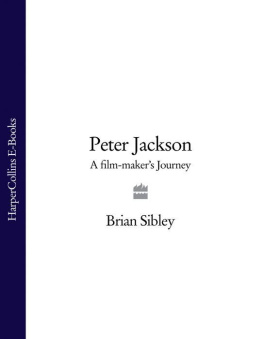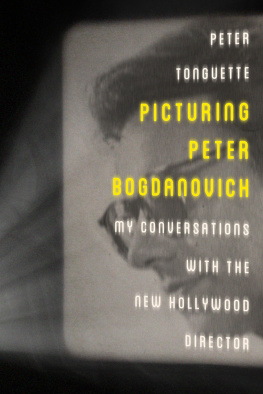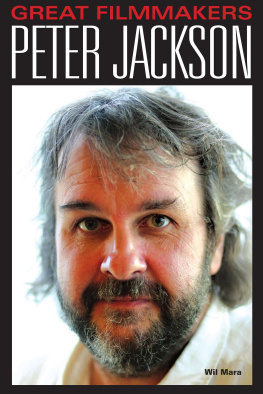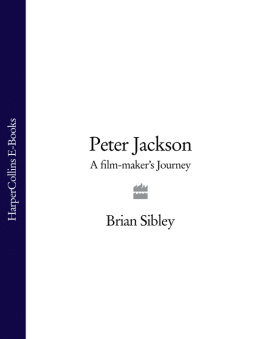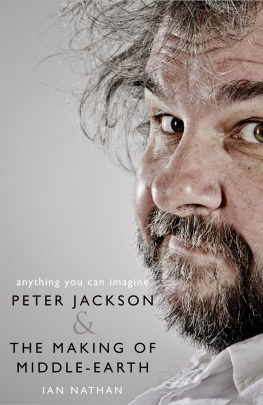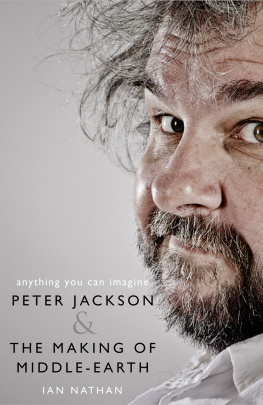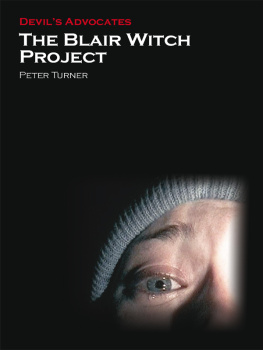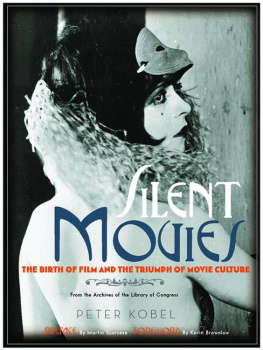H ow on earth did this guy ever come to be making The Lord of the Rings ?
That is a question that has been asked many times over the past few years. The person asking it, on this occasion, is the person about whom it is asked Peter Jackson
Most fans of The Lord of the Rings , he says, are probably not that familiar with my earlier films, so they may have the impression that I popped up out of nowhere and was suddenly directing this huge movie-project. But, from my perspective, I certainly didnt pop up out of nowhere. If I had, I never would have been equipped to direct The Lord of the Rings !
Peter Jackson is about to give me another interview for this book. Our conversations scattered across five years have taken place on movie-sets, in editing suites, via telephone from opposite ends of the earth and at opposite ends of the day, in his home in New Zealand and in various hotels during moments snatched between attending scoring sessions, giving media interviews and going to (or coming from) award ceremonies
For this interview we are in Londons Dorchester Hotel and Peter and his partner Fran Walsh are en route to what will turn out to be their grand-slam night at the Oscars.
We are having another conversation about this book and, specifically, how it should be described. Is it, for example, a biography? Frankly, that is not a definition with which Peter is altogether easy: it smacks, perhaps, too much of ego, suggests a sense of self-importance that is not quite to his taste
Certainly there must be biographical elements, but they ought to serve a specific end, which is to answer that question: How did this relatively unknown guy from New Zealand, whose previous career seems to have been predominantly concerned with making splattermovies, end up directing a literary Holy Grail like The Lord of the Rings ?
The short answer the longer version will be found in the pages which follow is that, throughout his childhood and adolescence, Peter Jackson was unwittingly auditioning to make The Lord of the Rings. His hobbies and interests passionately, even obsessively, pursued were consistently preparing the man for the task. And those preparations were to continue when he began his professional film-making career.
It was, he says, a hard slog to get as far as making The Lord of the Rings and it only happened because, for the ten years before, I had made movies and learnt enough about film politics to give me the skill base I needed to tackle this particular project. Ten years of film-making if you count the little amateur ones I made as a child, thirty years of film-making. People may or may not have seen, or even know of, those films, but that is almost beside the point, because it was the experience of facing the often seemingly overwhelming odds involved in making them creatively, technically, politically that really equipped me to face the enormous challenges that were involved in filming The Lord of the Rings.
Once that has been understood, the tale of the Kiwi who got to make a movie based on one of the most popular books in the world is less fluke than inevitability.
True, for every ambition there was a disappointment, for every dream, a nightmare. But one of Peter Jacksons commonly underestimated attributes is his pragmatism. Yes, he is a perfectionist, an idealist; but he is also a down-to-earth realist: someone who for better or worse, and regardless of accolades or criticisms sees life as it is and then does his level best to handle it in whatever way seems most desirable but always with the proviso that if it doesnt work out, then it is time to re-think, to adapt and survive
A combination of vision, talent, confidence, boundless enthusiasm and unswerving tenacity together with a reasonable helping of sheer, unadulterated good luck brought Peter Jackson to a point where he was directing the biggest, most ambitious film project in the history of cinema. And this then sustained him through the fourteen months of principal photography, during which that project one film but at the same time three films was brought to the screen.
This book, Peter said in one of our earliest conversations, should not be a mere re-run of the story people have read in the magazines and newspapers. Nor should it be just a nuts-and-bolts account of making three complex films. It must be a frank insider look into the workings and politics of film-making both independently and within the Hollywood system.
And, of course, to answer that question Why Peter Jackson? along with other intriguing questions, not least among them: Why, having made the phenominally successful The Lord of the Rings, did he then decide to devote his energy to a remake of a 1930s movie about a giant gorilla? and Why did it take him quite so long to get around to doing it?
But thats more than enough about questions. Time for some answers
Brian Sibley
Where is Peter Jackson?
W here is Peter Jackson? Thats what people are asking. It is 25 November 2003, and the Embassy Theatre in Wellington is re-opening its doors for the first time after a $4.66 million refurbishment that has been the price demanded by civic pride since New Zealand is to host the World Premiere of The Return of the King, the third and final part of the phenomenally successful movie trilogy, The Lord of the Rings.
That premiere is to take place at the Embassy in a weeks time and a gigantic figure of the Witch-king astride his Nazgl steed is perched on the roof in readiness to welcome a deputation of hobbits, dwarves, elves, warriors and wizards, not to mention the worlds media and thousands of devoted Rings fans who are already converging on the city.
Wellington is gearing itself up for a celebration that will be unlike any other movie opening in the history of cinema. It is about a great deal more than just the picture that will be screened on the night of 1 December 2003. It is about a new sense of national identity, about a Kiwi an idiosyncratic little fellow lacking the facile suavity usually associated with moviedom who has taken on Hollywood at its own game, produced a cinematic phenomenon and, at the same time, made the world aware of New Zealand as somewhere more than just a place that has a famous rugby team and which exports quantities of butter and lamb.
On this particular night, the great and the good of Wellington are gathering at the Embassy in order to witness the rebirth of a movie palace that, when it had originally opened in 1924, under the name of the de Luxe was hailed as one of the finest theatres south of the line. Now, after its costly facelift, it is ranked as being worthy of hosting a movie premiere which in Hollywood may be ten-a-cent any night of the week, but which here will be a historic event.
The film that is to be shown to the audience privileged to have a sneak peak at the Embassys revitalised Twenties opulence is a tale of two girls who retreat into a shared world of fantasy and then commit a shockingly violent crime. Made in 1994, Heavenly Creatures was based on the true story of the Parker/Hulme murder case that, forty years earlier, had rocked New Zealand society. Heavenly Creatures was Kate Winslets movie debut and the fourth feature film to be directed by Peter Jackson.
Some of the guests drinking champagne and nibbling canaps are wondering whether the acclaimed director is going to turn up to the event; those aware of Peters well-documented reputation for avoiding public appearances will be very surprised if he does. But the truth about what Peter is actually doing on this evening, instead of attending the bash at the Embassy, provides a pin-sharp focus on the Jackson character.

